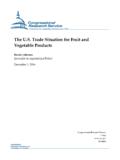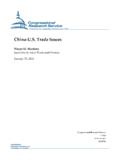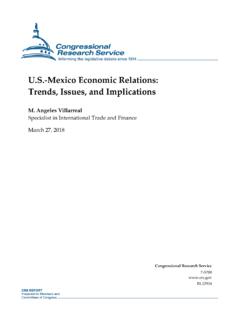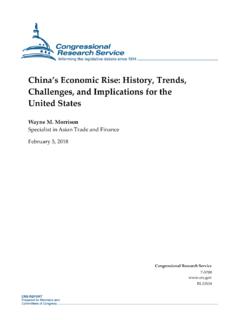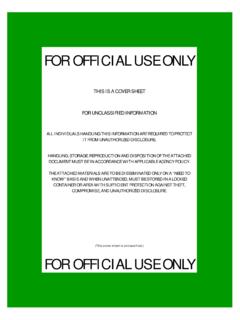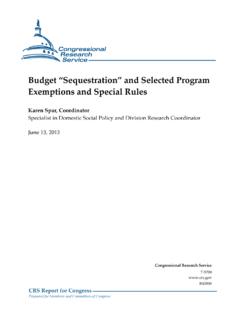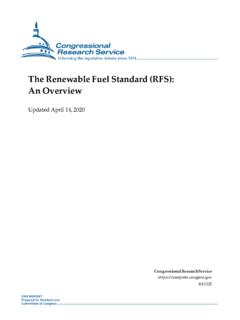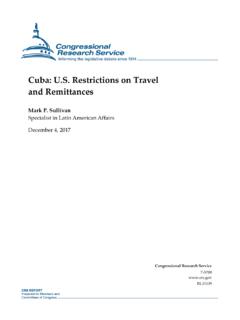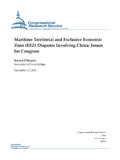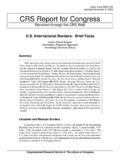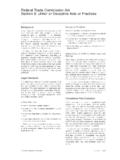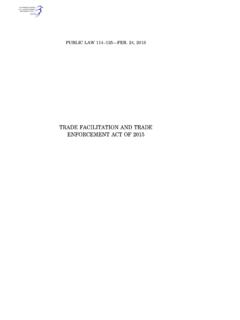Transcription of Trade Promotion Authority (TPA) and the Role of Congress ...
1 Trade Promotion Authority (TPA) and the Role of Congress in Trade Policy Ian F. Fergusson Specialist in International Trade and Finance June 15, 2015. Congressional Research Service 7-5700. RL33743. Trade Promotion Authority (TPA) and the Role of Congress in Trade Policy Summary Legislation to reauthorize Trade Promotion Authority ( TPA ), sometimes called fast track, was introduced as the Bipartisan Congressional Trade Priorities and Accountability Act of 2015 (TPA- 2015; 1890/S. 995) on April 16, 2015. The legislation was reported by the Senate Finance Committee on April 22, 2015, and by the House Ways and Means Committee the next day. TPA, as incorporated into 1314 by substitute amendment, passed the Senate on May 22 by a vote of 62-37.
2 In the House of Representatives, the measure was voted on under a procedure known as division of the question, which requires separate votes on each component, but approval of both to pass. Voting on June 12, TPA (Title I) passed by a vote of 219-211, but TAA (Title II) was defeated 126-302. A motion to reconsider that vote was laid by Speaker Boehner shortly after that vote. The previous grant of Authority expired on July 1, 2007. TPA is the process Congress has made available to the President to enable legislation to approve and implement certain international Trade agreements to be considered under expedited legislative procedures for limited periods, provided the President observes certain statutory obligations. TPA. defines how Congress has chosen to exercise its constitutional Authority over a particular aspect of Trade policy, while giving the President added leverage to negotiate Trade agreements by effectively assuring Trade partners that final agreements will be given timely and unamended consideration.
3 On July 30, 2013, President Obama first publicly requested that Congress reauthorize TPA, and he reiterated his request for TPA in his January 20, 2015, State of the Union address. Legislation to renew TPA was introduced in the 113th Congress ( 3830) (S. 1900), but it was not acted upon. TPA reflects decades of debate, cooperation, and compromise between Congress and the executive branch in finding a pragmatic accommodation to the exercise of each branch's respective authorities over Trade policy. The expedited legislative procedures have not changed since first codified in the Trade Act of 1974 ( 93-618). Congress , however, has required that the Authority to use TPA be periodically reauthorized, and at times has chosen to revise Trade negotiation objectives, the consultative mechanism, and presidential notification requirements.
4 While early versions of fast track/TPA received bipartisan support, later renewal efforts have been more controversial, culminating in a more partisan vote on the 2002 TPA renewal. Future debates on TPA renewal may center on Trade negotiation objectives, congressional oversight of Trade negotiations, Trade agreement enforcement, and clarifying the congressional Authority over approval of reciprocal Trade agreements and Trade policy more generally, among others. TPA renewal may become a more pressing issue in the 114th Congress because current Trade negotiations on the Trans-Pacific Partnership (TPP), the Transatlantic Trade and Investment Partnership (TTIP), and the Trade in Services Agreement (TISA) are in progress. Technically, TPA is not necessary to begin or even conclude Trade negotiations, but it is widely understood to be a key element of defining congressional Authority , and of passing Trade agreement implementing legislation.
5 Therefore, its renewal can be construed as signaling serious congressional support for moving ahead with Trade negotiations. Addressing congressional concerns over the definition and operation of TPA may be a central part of the debate. Although there appears to be support for renewal of TPA in Congress , the details of the legislation are likely to be subject to considerable debate, including the specific treatment of any related TAA program reauthorization. This report presents background and analysis on the development of TPA, a summary of the major provisions under the expired Authority , and a discussion of the issues that have arisen in the debate over TPA renewal. It also explores some of the policy options available to Congress .
6 Congressional Research Service Trade Promotion Authority (TPA) and the Role of Congress in Trade Policy Contents 1. A Brief History of TPA .. 2. The Constitution and Foreign Trade .. 2. The Evolution of the Congressional-Executive Partnership .. 2. Creation of Fast Track Trade Negotiating Authority .. 4. Subsequent Renewals of Trade Agreements Authority .. 5. The Trade Agreements Act of 6. The Trade and Tariff Act of 1984 .. 6. Omnibus Trade and Competitiveness Act of 1988 (OTCA) .. 6. A Hiatus .. 6. The Bipartisan Trade Promotion Authority Act (BTPA) of 7. The Bipartisan Comprehensive Trade Priorities and Accountability Act of 2015. (BCTPA) .. 8. The Elements of TPA .. 8. Trade Agreements 9. Implementation of Trade Agreements.
7 10. Expedited Legislative Procedures .. 10. Negotiating Objectives .. 11. Notification and 12. Limiting Trade Agreements Authority .. 13. Sunset Provision .. 13. Extension Disapproval .. 14. Procedural Disapproval .. 14. Consultation and Compliance Resolution (CCR) .. 14. Withdrawal of Expedited Procedures .. 14. Congressional Procedures Outside TPA .. 15. Hearings and Mock Markups .. 15. Side Agreements and Letters .. 15. Informal Agreements .. 16. Possible Issues for Congress .. 16. The Need for and Timing of TPA .. 16. Definition and Scope of Negotiating Objectives .. 17. Consultation and 18. Trade Agreement Enforcement .. 18. Technical 18. Options for Congress .. 19. Current Legislation .. 20. Figures Figure B-1. Congressional Timeline.
8 22. Congressional Research Service Trade Promotion Authority (TPA) and the Role of Congress in Trade Policy Appendixes Appendix A. Congressional Trade Agreements Authority Requested by and Granted to Presidents Since 1934 .. 21. Appendix B. Congressional Timeline under TPA .. 22. Appendix C. A Short Guide to the Expedited Legislative Procedures for Passage of Trade Implementing Bills Under TPA .. 23. Contacts Author Contact 24. Acknowledgments .. 24. Congressional Research Service Trade Promotion Authority (TPA) and the Role of Congress in Trade Policy L egislation to reauthorize Trade Promotion Authority (TPA), formerly called fast track, was introduced as the Bipartisan Congressional Trade Priorities and Accountability Act of 2015.
9 (TPA-2015) ( 1890/S. 995) in the Senate and the House on April 16, 2015. The legislation was reported by the Senate Finance Committee on April 22, 2015, and by the House Ways and Means Committee on April 23, 2015. The legislation, as reported by the Senate Finance Committee, was joined with legislation extending Trade Adjustment Assistance into a substitute amendment to 1314 (an unrelated revenue measure), and the legislation passed on May 22. by a vote of 62-37. In the House of Representatives, the measure was voted on under a procedure known as division of the question, which requires separate votes on each component, but approval of both to pass. Voting on June 12, TPA (Title I) passed by a vote of 219-211, but TAA. (Title II) was defeated 126-302.
10 A motion to reconsider that vote was laid by Speaker Boehner shortly after that vote. TPA is the process Congress has made available to the President to enable legislation to approve and implement certain international Trade agreements to be considered under expedited legislative procedures for limited periods, provided the President observes certain statutory obligations. Although the President has the Authority under the Constitution to negotiate international agreements, typically a reciprocal Trade agreement requires an implementing bill and, therefore, congressional action to bring it into force. Many Members of Congress have advocated for renewal of TPA. On July 30, 2013, President Obama first publicly requested that Congress reauthorize TPA.
